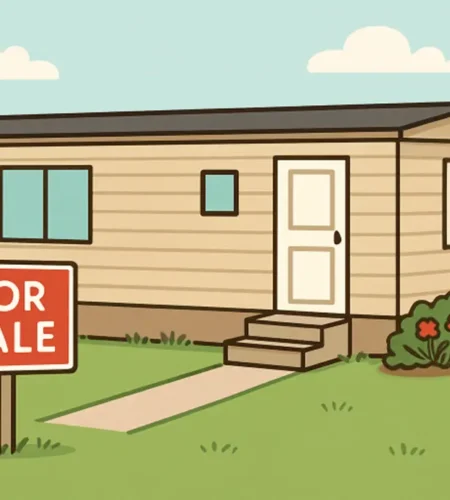Introduction: Why Selling a Mobile Home is Unique
Selling a mobile home is a distinct process compared to selling traditional real estate. Whether your mobile home is located on rented land or on owned property, unique legal, financial, and structural considerations often arise. Understanding these differences can help you make smarter decisions and maximize your sales potential. If you’re looking to simplify the process, working with a specialized service like Cash for Mobile Home Texas can be an effective way to secure a fast, hassle-free transaction.
From paperwork requirements to negotiations and pricing, homeowners often encounter complexities not present in standard home sales. By arming yourself with the right knowledge and tools, you’ll be better prepared to overcome these unique challenges and achieve a successful sale.
Types of Mobile Homes & What They Mean for Sellers
The type, age, and location of your mobile home greatly influence its sale. Mobile homes are categorized as single, double, or triple-wide, affecting price and buyer interest. The model year and HUD standards impact who can buy, financing options, and inspections. Homes in parks follow park rules; those on private land face different buyer criteria. Buyers are often more attracted to homes that come with land, but partnering with the right company to buy used mobile homes can help you find interested parties no matter your situation.
Additionally, understanding local zoning laws can influence the sale process and potential prices. It’s also beneficial to assess the condition of the mobile home before listing it for sale, as this can impact buyer interest. Consulting with a real estate expert in mobile homes can provide valuable insights and strategies for a successful sale.
Preparing Your Mobile Home for Sale
Maintenance and Repairs
First impressions are critical. Tackle repairs like leaks, wiring, or skirting, and address minor issues like squeaky doors, broken fixtures, or stained carpets. Move-in-ready homes attract buyers and fetch higher prices. Enhance curb appeal by cleaning siding, planting flowers, and tidying the entryway. A clean exterior creates an inviting atmosphere and draws in buyers.
Staging Ideas
Declutter interior spaces and depersonalize decor. Arrange furniture to maximize the living space and highlight the natural light. Small updates within your budget, such as fresh paint or modern hardware, can make rooms more appealing.
Understanding Title and Ownership Structures
Personal Property vs. Real Property
Mobile homes are usually titled as personal property, similar to vehicles. However, if your mobile home is affixed to land you own and has been recorded with the local authority, it may be considered real property. This difference changes the type of contract and closing process required.
How Land Ownership Affects the Sale
Selling a mobile home with land can broaden your pool of buyers, including those seeking traditional financing. If your home is situated on rented land in a park, buyers may need to qualify with the park management separately; therefore, make information on park rules and fees available upfront.
Legal Requirements and Disclosure Obligations
Essential Documents
You’ll need the title, bill of sale, and recent inspection reports. If land is included, a property deed and relevant surveys are also necessary. Ensure all loans or liens are paid off, as these must be cleared before transfer.
State-Specific Laws
Requirements vary by state. For example, some states mandate a formal escrow process, while others primarily use a simple title transfer. Review local guidelines to avoid unexpected delays or fines. Resources like Nolo’s guide to sellers’ obligations can clarify your responsibilities.
Disclosure Obligations
Disclosures protect both buyer and seller. You must reveal known defects, past damage, or issues affecting habitability. Transparent documentation builds trust and mitigates legal risks.
Pricing Strategies for Today’s Market
Researching Comparable Sales
Investigate recent sales of similar mobile homes in your area to understand current market values. Online databases, real estate agents, and appraisal services can all provide helpful comparisons.
Adjusting Price Based on Condition
Adjust your price expectations for homes that require significant repairs or upgrades. Highlighting recent improvements allows you to justify a higher asking price and increases the appeal to discerning buyers.
Marketing Your Mobile Home
Platforms and Listing Tips
Utilize multiple listing platforms, including Realtor.com, Craigslist, and dedicated mobile home marketplaces. Accurate, compelling descriptions and complete information make your listing stand out. For expert advice, consult market insights from trusted sources.
Professional Photos and Descriptions
Professional photography highlights your home’s best features and creates a strong first impression—pair images with honest, detailed descriptions that address layout, upgrades, and location benefits.
Virtual Tours
Virtual tours and video walkthroughs are increasingly popular, attracting serious buyers who may not be local and reducing time spent on in-person showings.
Navigating Offers and Negotiations
Evaluating Offers
Review offers carefully. Compare not just the price, but also the contingencies, financing terms, and the buyer’s ability to close on time.
Negotiating Terms
Be prepared to negotiate repairs, removal of old structures, or assistance with closing costs. Flexibility on your part can help seal the deal, especially in competitive markets.
Closing the Deal: Final Steps for a Successful Sale
Inspections
Most buyers will request a professional inspection. Be prepared to address any resulting issues or offer concessions to keep the process moving forward.
Final Paperwork
Collect all required signatures, settle outstanding balances, and transfer the title or deed. For sales in parks, ensure the new owner is approved by park management if necessary.
Transferring Ownership
Follow through promptly with local authorities to record the sale and ensure a smooth transition. Save copies of all finalized documents for your records.
Tips for a Smooth Selling Experience
Common Pitfalls
Avoid mispricing, neglecting repairs, or overlooking disclosure requirements—these missteps can delay or derail your sale. Enlisting specialized real estate professionals minimizes avoidable errors.
Resources for Sellers
Useful resources include government housing websites, legal aid organizations, and large real estate platforms. For additional insights into selling, review guidance on how to sell your house from reputable publications.
Also Read-Homographic Pun: Unleashing Humor Through Wordplay


Comments